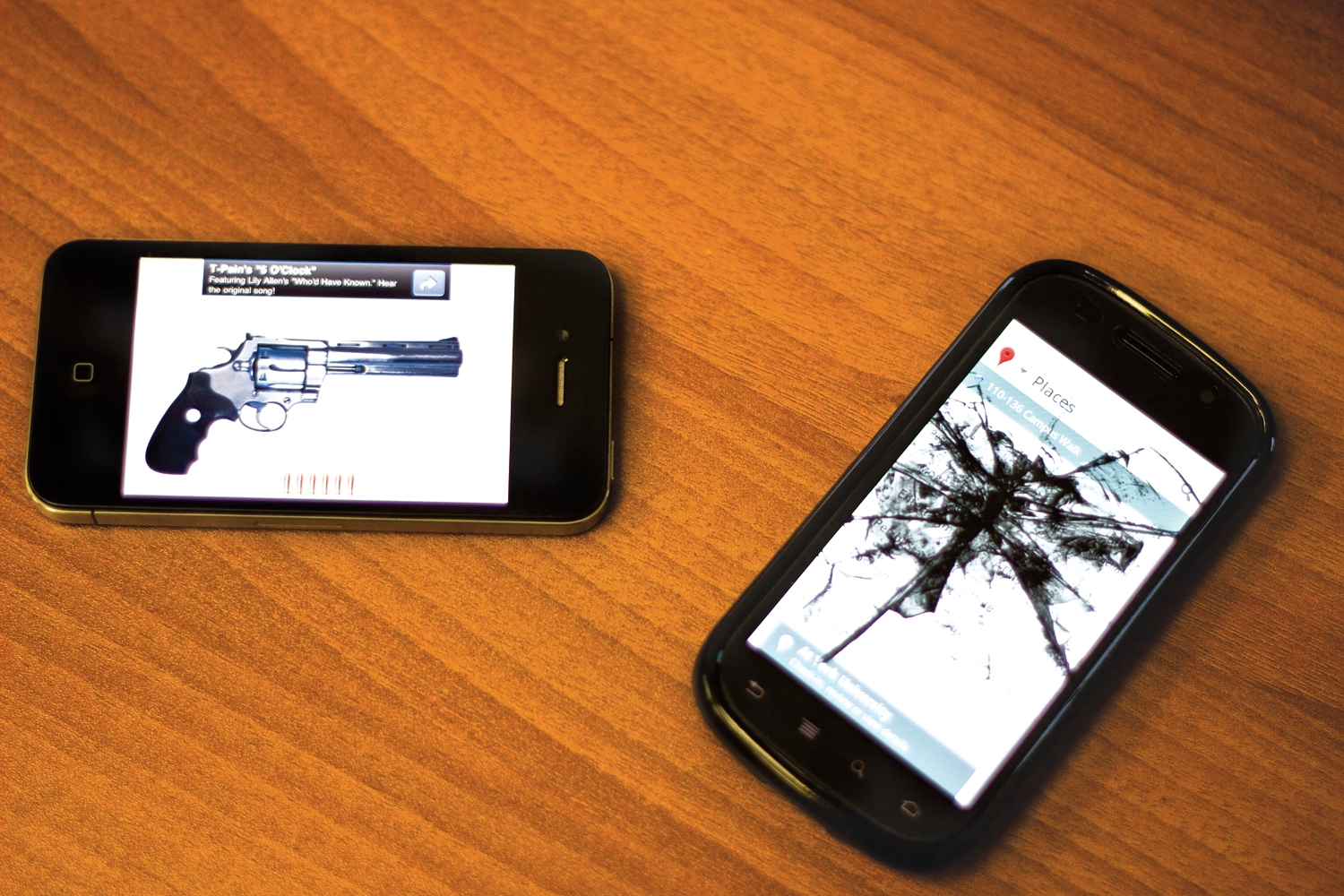What motivates student consumers to pick Androids over iPhones?

Staff writer
@excalweb
Second-year English and European studies student Alicia Edwards had a life-changing decision to make at the beginning of the year: the iPhone or the Android?
Many of her friends own an iPhone. There is, she says, always a pressure to follow what friends are doing. “They’re the ones with the Macs,” she says. “They’re the ones that want the Apple thing. I think having the Apple is more important than the software—or anything.”
Canadian consumers like Apple. In a 1,000-strong poll conducted by Ipsos Reid, Apple was voted by Canadians as the number one leading-edge company.
Consumers are also voting with their wallets. Apple sold 37 million iPhones during the 2011 Christmas season. The iPhone accounted for 53 per cent of Apple’s profits in the first quarter, outpacing the popular iPad and the MacBook.
How is Apple flourishing?
According to Navneet Alang, York PhD student and technology critic for The Toronto Standard, there are several factors. Not all of them are “it’s an iPhone.”
“A lot has to do with branding,” he agrees. “[But] if all your friends are using an iPhone, then you’ll be pushed into getting one. It’s the networking effect,” he says, “people like to connect with each other.”
Edwards agrees. Having an Apple product, she says, is the cool thing to do.
“Apple is a symbol of living in a contemporary year,” says Alang. “It’s become a cultural symbol, like a cup of Starbucks for [the] urban and middle-class.”
“People connect to symbols because they’re trying to show who they are through them. They want symbols of a contemporary lifestyle. Apple provides.”
Alang says the iOS user interface is another contributing factor. “iPhones have a reputation as being easy to use,” he explains. Consumers have a perception that Android isn’t as easy to use as iOS. Android’s user interface, in Alang’s opinion, is an imitation of iOS but it’s not quite as slick.
Edwards believes more technologically adept users go to Android. They can strip down their phone, add to it, or take away from it. iPhone users, she says, are “take it as it is people,” she says, “they don’t know how [to mod phones], or they don’t bother building on the phone they already have.”
Edwards had a list of must haves ready when she went in search of a phone. She was tired of her worn-out LG and ready to upgrade. She did three weeks’ worth of research, looking at battery life, programming, and integration between hardware and software.
The problem with the iPhone, Edwards says, is that she already owned an iPod. She says she’s always been a PC user, which influenced her decision. “I don’t need to sense my phone with a Mac.”
Edwards liked how frequently Android upgraded, and how you can get their upgrades anywhere online. She was iffy about the iPhone’s hardware and software.
“I don’t wanna wait for Apple to put out an upgrade,” she says. “I want to be able to go on the internet, search it up and download it. Apple outdates itself and four or five months later, there’s a new model. Why do people want to buy a phone that’s almost outdated because there’s already a new one coming out?” she asks.
Alang disagrees. “I use an Android,” he says. “At the end of the day, it doesn’t work as well [as the iPhone]. It’s not as smooth and it’s prone to crashing. [It’s] because there are multiple versions of the Android OS, and Google doesn’t control which version developers will choose to use.”
He likes his Sony Ericsson Xperia Arc, however. Android integrates well with Google’s programs, like Gmail and Google+.
But for a lot of people, Alang says, that geeky reason isn’t a good reason. “The iPhone looks good, and it works well. People like good design. No Android manufacturer is likely to build such an expensive phone,” he points out.
“Because Apple controls its distribution chain, they can afford to produce these phones cheaper. The pull of the iPhone is about its design.”
Androids use open-source software, and Edwards notices that most people don’t want to revamp their phones. “They want to turn it on and go download apps. That’s it.”
The Android’s open-source software is not as important as Google thinks it is.
Alang says outsourcing software development to third parties with open access to the Android platform was the right move in the past. Now, he says, Google should consider tightening its fragmented operations. “I’m reviewing the Galaxy Nexus,” he says. “The reason the phone works so well is because it was made by Google. They need to lay down clear rules about performance, and [set up] some kind of specifications to ensure [quality control].”
Edwards prefers Android’s diverse selection of phones. “Apple, who just has the iPhone, says ‘This is what you want. This is the only thing you want. We perfected it,’” she says as one thing against iPhones.
Alang says the primary advantage Google has over Apple is the integration with Google programs like Gmail. “I can even filter which friends or family I want to receive emails from. On the iPhone, you get notifications for everything.”
Edwards eventually chose the HTC Sensation for its camera capabilities and user-friendly sense. “I’d rather have a good, solid phone with everything I need,” she says.
With files from The Globe and Mail





